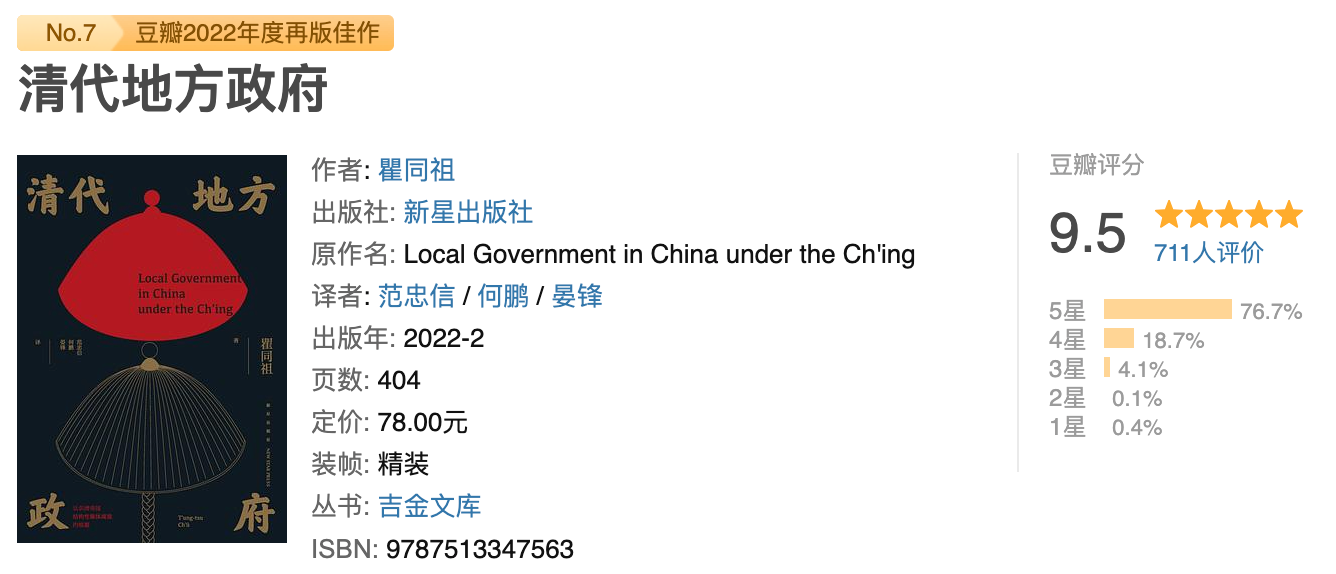Original link: https://aaronnick.github.io/posts/local-government-in-china-under-chiing/

This is an excellent book for understanding how prefectural and county officials managed places in the Qing Dynasty. The structure is clear, the content is clear, and there is no nonsense. The author, Qu Tongzu, and his grandfather, Qu Hongxuan, were ministers of military affairs in the late Qing Dynasty.
The reason why its structure is clear, you can know a thing or two by looking at the catalog. First briefly introduce the state and county governments, then start talking about the state and county officials, and then describe their selection and responsibilities around the four assistants of the state and county officials: scribes, yamen servants, long followers, and assistants, and finally talk about the most important income of the government Source: taxation, and the gentry class closely related to local administration.
Among them, the part about the county magistrates and the four assistants gave me a lot of harvest . Perhaps it is because the author’s way of telling is layered and comprehensive (through selection, appointment, treatment, corruption methods, etc.), or maybe it is because these are real. Some individuals here have a little understanding through TV dramas or reading books, but they are not deep enough. Through this book, they can understand more comprehensively.
There are a few points worth noting:
- The regular salary of county magistrates is not high: 45-80 taels/year. Even if there is 500-2000 taels/year of Yanglian silver (money for cultivating honesty) later, it is not enough to meet the daily expenses of the yamen.
- State and county magistrates cannot serve in their home provinces. Facing an unfamiliar environment, they must rely heavily on local clerks, but they must always guard against corruption by cunning clerks—after all, scribes basically have no salary.
- Most of the four assistants belong to the untouchables, such as the fast catchers and long followers among the yamen servants. Untouchables cannot participate in the imperial examination, and it will even affect the “three generations”. It is seriously doubted that some of the current systems are the Qing Dynasty system…
- Muyou are masters, with a high status, and even the county magistrates have to respect them, otherwise they will resign and run away at any time. Their treatment is also the highest, and their income is even higher than that of state and county officials. After all, state and county officials often need to pay for their superiors or meet other expenses.
It can be seen from the book that the salaries of local officials or staff are basically beyond their means . Therefore, the process of exercising power will produce so-called “dirty rules”, that is, ugly rules. As long as you deal with people and have a process, you can’t do without bad rules. Thousands of bad rules have even become the main source of income for clerks, government servants and others. This is why many people still fight for certain positions even though they are untouchables. for the sake.
The people in the temple naturally know about these bad rules far from the rivers and lakes, but they can’t do anything about it, because they don’t have much money to pay these low-level officials, so they can only rely on them to figure out a way, and the way they can think of is naturally to squeeze the people at the bottom—— As long as the rule is not endangered, the people in the temple naturally don’t care. Therefore, in the face of “innocuous” behavior, they turn a blind eye to it. Of course, in the later period, these bad practices became more and more rampant, and even considered a threat to the rule of the empire, the emperor began to rectify them. The more famous and effective one was the return of fire consumption to the public. This policy did effectively reduce the bad practices.
This article is transferred from: https://aaronnick.github.io/posts/local-government-in-china-under-chiing/
This site is only for collection, and the copyright belongs to the original author.